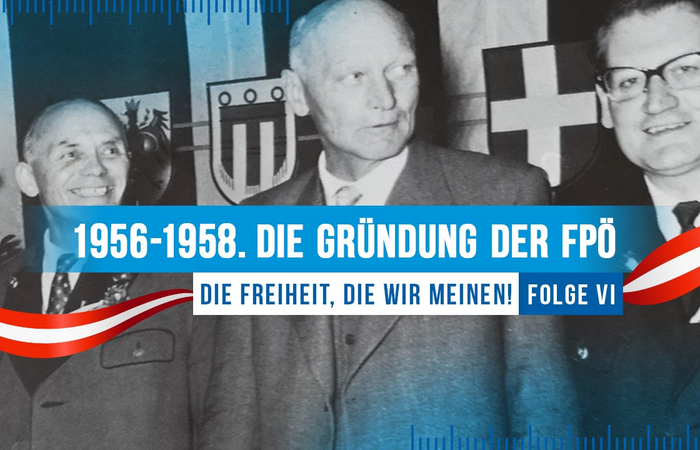The History of the FPÖ: Part 6
1956 - 1958. The Founding of the FPÖ
We have just published Part 6 of our documentary series on the history of the national-liberal Lager and the FPÖ. Watch the film "Part 6: The Founding of the FPÖ. The Years 1956-1958”
LINK to YouTube: The Founding of the FPÖ
The Freedom Party of Austria came into being on 7 April 1956 at a founding party conference. In its name it bears the word "Freiheit" (freedom), which is considered a core element of its programme. However, the roots of this national-liberal community of shared beliefs go back to the early 19th century. In our new series we illuminate the history of the national-liberal Lager and the FPÖ.
Part 6: 1956 - 1958. Die Founding of the FPÖ
On 17 October 1955, the Chairman of the VdU Max Stendebach and the Chairman of the Freedom Party Anton Reinthaller agreed in Vienna to merge their two parties to form the FPÖ and to simultaneously dissolve both the VdU and the Freedom Party.
The choice of name itself points to one of the basic principles of the FPÖ: The freedom of the individual as well as the freedom of the community and of one’s own people should be at the centre of all policy statements and programmes.
However, it was not until 7 and 8 April 1956 that the constitutive party conference, which was also the founding party conference, met in the hotel “Zum weißen Hahn” located in the Viennese district of Josefstadt. Among the founding members were Willfried Gredler, Jörg Kandutsch, Tassilo Broesigke, Gustav Zeillinger and Max Stendebach from the VdU, and Anton Reinthaller, Emil van Tongel and Friedrich Peter from the Freedom Party.
The fact that Anton Reinthaller was elected as the first Chairman of the FPÖ is often cited by researchers as indicating that within the new FPÖ, the Freedom Party and its more national-conservative programme had prevailed over the somewhat more liberal positions of the VdU. This attitude was also reflected in the first party programme, which was approved as the so-called Short Programme or “Fourteen Points” at the founding party conference in 1956 and explained in more detail in the 1958 “Richtlinien freiheitlicher Politik”.
It is worth adding in this connection that Anton Reinthaller remains a figure of controversy. Born in Upper Austria, Reinthaller was considered after the war to have been one of the former high-ranking National Socialists in Austria. He had for example served as Minister of Agriculture in the “Anschluss Government” installed by Hitler’s Germany and led by Chancellor Arthur Seyß-Inquart. For some, the committed Catholic was considered an “idealist” who had played no part in the crimes of National Socialism. For others, however, he was also a former SS Brigade Leader, who had already been agitating for the Anschluss of Austria to Germany whilst that was still illegal.
But the FPÖ’s hope that by adopting a markedly national party line it could build on the successes of the Third Lager during the inter-war period and obtain up to 18 percent of the vote in National Council elections was not fulfilled. At the National Council elections of May 1956, the FPÖ obtained only 6.5 percent of the vote and six National Council seats.
The FPÖ’s parliamentary group in the National Council was from the outset committed to the roles of opposition and scrutiny. Its members included Caucus Leader Willfried Gredler; former university professor Helfried Pfeifer; former VdU Chairman Max Stendebach; Heinrich Zechmann, previously Provincial Chairman of the VdU Salzburg and subsequent Ombudsman Gustav Zeillinger, as well as Jörg Kandutsch, who later became President of the National Audit Office (Rechnungshof). Within the organisation, the Viennese pharmacist Emil van Tongel held the positions of press and finance officer.
After the death of Anton Reinthaller in 1958, Friedrich Peter was elected Federal Party Chairman. This marked the end of the founding phase of the FPÖ. Yet the party was not yet able to come out of its domestic political isolation and had to compete for recognition in the Black-Red dominated political landscape of the Second Republic.
Click here for the film: https://youtube/The Founding of the FPÖ
